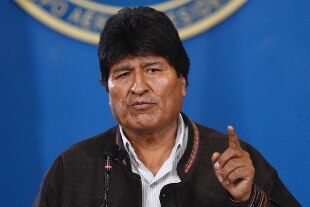- Bolivia, clashes between police and opponents. Mesa: "Either I go to jail or become president"
- Bolivia, Morales claims electoral victory and the square rises
- Bolivia: Morales wins in the first round, confirmed to the presidency
Share
10 November 2019The Bolivian president Evo Morales denounced tonight in front of the international community and the Bolivian people that "the fascist coup plan carries out violent acts with irregular groups that have set fire to the house of the governors of Chuquisaca and Oruro and that of my sister in this quest 'last city'.Via Twitter Morales also condemned the "cowardly and savage" attack, "in the style of military dictatorships," on the radio of the Single Trade Union Confederation of Peasant Workers of Bolivia (Csutcb). Morales denounced "the attitude of the former defenders of the people" who "instead of protecting human rights violate the freedom of expression and join the racist plots of the coup to try against the state media as did military dictatorships". "They want to silence the press to perpetrate the coup," he said.
Denunciamos y condenamos ante la comunidad internacional y pueblo boliviano that the plan of the fascist coup ejecuta actos violentos with grupos irregulares that incendiaron the house of gobernadores de Chuquisaca y Oruro y de mi hermana en esa ciudad. Preservemos la paz y la democracia
- Evo Morales Ayma (@evoespueblo) November 10, 2019The head of state also revealed that "organized groups" took control of the state-owned media Bolivia TV (BTV) and Red Patria Nueva (Rpn). "After threatening and intimidating journalists - he concluded - they forced them to abandon their sources of work".
Police units join the protests
The tension remains very high in Bolivia where the ruling party has invited supporters to occupy the streets of La Paz to defend the disputed re-election of President Evo Morales. On Friday, the police in three cities joined the anti-government protests. Morales has called for dialogue with opposition parties sitting in parliament, but has explicitly excluded the powerful regional civic committees that oppose him. The opposition leader, former president Carlos Mesa, immediately rejected Morales' gesture. The offer was also rejected by Ruben Costas, the powerful governor of the eastern state of Santa Cruz.
The police rebellion broke out on Friday in the elite unit known as Utop in the city of Cochabamba. It then spread to the units of Sucre and Santa Cruz, a stronghold of the opposition. During the night the rebellion reached other cities, but spared La Paz, the administrative capital of the country. But a worrying sign for the Morales government is that Utop officials in La Paz, who for weeks watched the central Plaza Murillo - where the presidential palace is located - have retreated to their headquarters in the last hours in evident solidarity with the protests .
Oas: impossible to verify election results
The Organization of American States (Oas) has made it known that it is unable to verify the results of the elections that confirmed Morales in power on October 20 and, in a preliminary report on the vote, recommended a new election election. The OAS also claimed that it is "statistically unlikely" that Morales gained an advantage of more than 10% on the main opponent, the centrist Carlos Mesa, a result that under the electoral law led him to victory in the first round.

